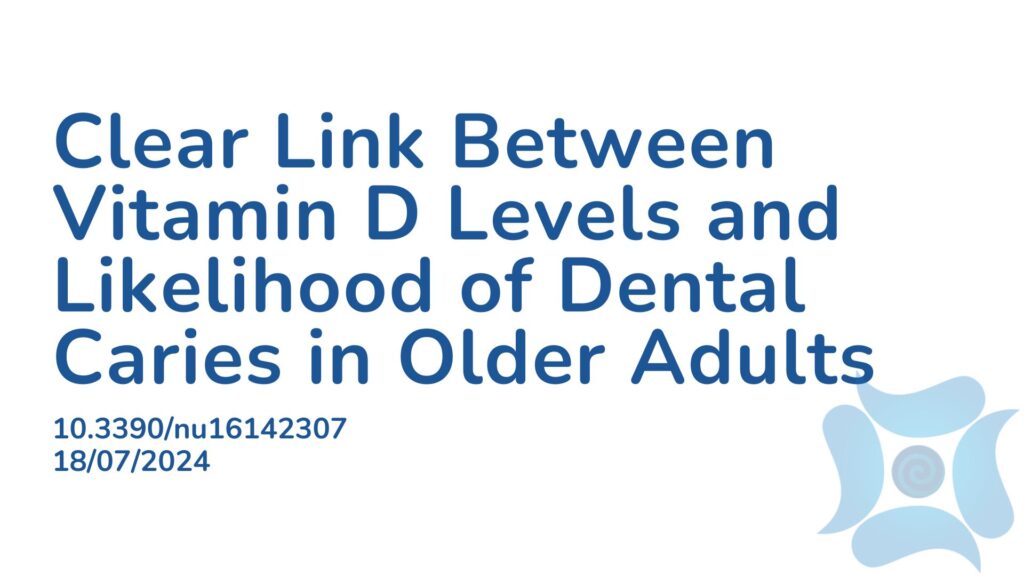Summary:
It is common for research on vitamin D and dental caries to focus only on children and young adults; however, this study aimed to investigate the association between vitamin D levels and dental caries in older adults using data from the U.S. National Health and Nutrition Examination Survey (2011-2016). Dental caries are damaged areas of teeth that develop into holes and can be caused by oral bacteria, smoking, diet, and poor oral hygiene. Data from 2,723 participants aged over 65 who completed dental exams and had their vitamin D levels tested were analyzed. Dental caries were assessed, and then vitamin D levels were categorized as severely deficient, deficient, insufficient, and normal. The association between the two was then analyzed. The results showed that 35.1% of participants had untreated caries. Vitamin D deficiency was linked to a 1.44 times higher likelihood of untreated caries, which reduced to 1.23 after adjusting for demographics such as age, gender, country of birth, and ethnicity. Severe vitamin D deficiency correlated with a 1.13 times higher decayed, missing, and filled teeth score, slightly reduced to 1.12 after adjustment for demographics. The authors concluded that adequate vitamin D levels may be crucial for dental health in older adults and that vitamin D deficiency is associated with a higher likelihood of decayed, missing, or filled teeth. Public health strategies should include vitamin D screening and supplementation for high-risk groups to improve oral health outcomes.
Abstract:
Introduction: Most research examining vitamin D and dental caries focuses on children and younger adults. This study investigated the association between vitamin D levels and dental caries in older adults using data from the United States National Health and Nutrition Examination Survey from 2011 to 2016.
Methods: Data were analyzed from 2723 participants aged 65 years and older who completed both dental examinations and serum 25(OH)D tests. Dental caries assessments included the decayed, missing, and filled teeth (DMFT) index and the presence of untreated dental caries. Vitamin D levels were measured as serum 25(OH)D concentrations and categorized as severely deficient (<25 nmol/L), deficient (25–49.9 nmol/L), insufficient (50–74.9 nmol/L), and normal (≥75 nmol/L). Logistic regression and Poisson regression models were used to assess the association between vitamin D levels and dental caries, adjusting for demographic factors.
Results: The mean DMFT score was 17.73 ± 8.34, with 35.1% of participants having untreated dental caries. Vitamin D deficiency was associated with a 1.44 times higher likelihood of untreated caries (95% CI: 1.15, 1.81), which weakened after adjustment for demographic factors (adjusted OR: 1.23, 95% CI: 0.97, 1.55). Severe vitamin D deficiency correlated with a 1.13 times higher DMFT score (95% CI: 1.06, 1.20), with the association remaining similar after adjustment (adjusted RR: 1.12, 95% CI: 1.05, 1.20). Significant differences in vitamin D levels were observed across gender, race/ethnicity, and country of birth.
Conclusions: This study suggests the potential importance of adequate vitamin D levels for maintaining dental health among older adults. Vitamin D deficiency is associated with a higher risk of poorer DMFT scores. Public health strategies that include vitamin D screening and supplementation, particularly for high-risk groups, may improve oral health outcomes in the older adult population. Further research is needed to elucidate the mechanisms by which vitamin D influences dental health and the potential for vitamin D supplementation to reduce the burden of dental caries in older adults.
Article Publication Date: 18/07/2024
DOI: 10.3390/nu16142307



